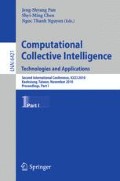Abstract
The multi-mode resource-constrained project scheduling problem with minimum and maximum time lags is considered in the paper. An activity is performed in a mode, which determines the demand of renewable and nonrenewable resources required for its processing and minimum and maximum time lags between adjacent activities. The goal is to find a mode assignment to the activities and their start times such that all constraints are satisfied and the project duration is minimized. Because the problem is NP-hard a population-learning algorithm (PLA2) is proposed to tackle the problem. PLA2 is a population-based approach which takes advantage of the features common to the social education system rather than to the evolutionary processes. The proposed approach perfectly suits for multi-agent systems because it is based on the idea of constructing a hybrid algorithm integrating different optimization techniques complementing each other and producing a synergetic effect. Results of the experiment were compared to the results published in Project Scheduling Problem Library.
Access this chapter
Tax calculation will be finalised at checkout
Purchases are for personal use only
Preview
Unable to display preview. Download preview PDF.
References
Alba, E., Troya, J.: Analysis of Synchronous and Asynchronous Parallel Distributed Genetic Algorithms with Structured and Panmictic Islands. In: Rolim, J., et al. (eds.) Proceedings of the 10th Symposium on Parallel and Distributed Processing, San Juan, Puerto Rico, USA, April 12-16, pp. 248–256 (1999)
Bartusch, M., Mohring, R., Radermacher, F.J.: Scheduling project networks with resource constraints and time windows. Annals of Operations Research 16, 201–240 (1988)
Belding, T.C.: The Distributed Genetic Algorithm Revisited. In: Eshelman, L.J. (ed.) Proceedings of the Sixth International Conference on Genetic Algorithms, pp. 114–121. Morgan Kaufmann, San Francisco (1995)
De Boer, P.-T., Kroese, D.P., Mannor, S., Rubinstein, R.Y.: A Tutorial on the Cross-Entropy Method. Annals of Operations Research 134(1), 19–67 (2005)
Brucker, P., Drexl, A., Mohring, R., Neumann, K., Pesch, E.: Resource-constrained project scheduling: notation,classification, models, and methods. European Journal of Operational Research 112, 3–41 (1999)
Czarnowski, I., Gutjahr, W.J., Jędrzejowicz, P., Ratajczak, E., Skakovski, A., Wierzbowska, I.: Scheduling Multiprocessor Tasks in Presence of Correlated Failures. In: Luptaćik, M., Wildburger, U.L. (eds.) Central European Journal of Operations Research, vol. 11(2), pp. 163–182. Physika-Verlag, A Springer-Verlag Company, Heidelberg (2003)
Dorndorf, U., Pesch, E., Toan, P.H.: A time-oriented branch-and-bound algorithm for project scheduling with generalised precedence constraints. Management Science 46, 1365–1384 (2000)
Elmaghraby, S.E.: Activity Networks—Project Planning and Control by Network Models. Wiley, New York (1977)
Glover, F.: Tabu search: a tutorial. Interfaces 20, 74–94 (1990)
Gordon, V.S., Whitley, D.: Serial and Parallel Genetic Algorithms as Function Optimizers. In: Forrest, S. (ed.) Proceedings of the Fifth International Conference on Genetic Algorithms, pp. 177–183. Morgan Kaufmann, San Mateo (1993)
Heilmann, R.: Resource-constrained project scheduling: a heuristic for the multi-mode case. OR Spektrum 23, 335–357 (2001)
Heilmann, R.: A branch-and-bound procedure for the multi-mode resource-constrained project scheduling problem with minimum and maximum time lags. European Journal of Operational Research 144, 348–365 (2003)
Herroelen, W., Demeulemeester, E., De Reyck, B.: A classification scheme for project scheduling. In: Węglarz, J. (ed.) Project Scheduling: Recent Models, Algorithms and Applications, pp. 1–26. Kluwer, Boston (1999)
Jędrzejowicz, J., Jędrzejowicz, P.: Population–Based Approach to Multiprocessor Task Scheduling in Multistage Hybrid Flowshops Knowledge-Based Intelligent Information and Engineering Systems. In: Palade, V., Howlett, R.J., Jain, L. (eds.) KES 2003. Lecture Notes in Computer Science, LNAI, vol. 2773, pp. 279–286. Springer, Heidelberg (2003)
Jędrzejowicz, J., Jędrzejowicz, P.: PLA–Based Permutation Scheduling. Foundations of Computing and Decision Sciences 28(3), 159–177 (2003)
Jędrzejowicz, J., Jędrzejowicz, P.: New Upper Bounds for the Permutation Flowshop Scheduling Problem. In: Ali, M., Esposito, F. (eds.) IEA/AIE 2005. LNCS (LNAI), vol. 3533, pp. 232–235. Springer, Heidelberg (2005)
Jędrzejowicz, P.: Social Learning Algorithm as a Tool for Solving Some Difficult Scheduling Problems. Foundation of Computing and Decision Sciences 24, 51–66 (1999)
Jędrzejowicz, P., Skakovski, A.: A Population Learning Algorithm for Discrete-Continuous Scheduling with Continuous Resource Discretisation. In: Chen, Y., Abraham, A. (eds.) 6th International Conference on Intelligent Systems Design and Applications, ISDA 2006 Special session: Nature Imitation Methods Theory and practice (NIM 2006), October 16-18, vol. II, pp. 1153–1158. IEEE Computer Society, Jinan (2006)
Jędrzejowicz, P., Skakovski, A.: A cross-entropy-based population-learning algorithm for discrete-continuous scheduling with continuous resource discretisation. Elsevier, Neurocomputing 73(4-6), 655–660 (2010)
Jędrzejowicz, P., Czarnowski, I., Skakovski, A., Szreder, H.: Evolution-based scheduling of multiple variant and multiple processor programs. In: Hertzberger, L.O., Sloot, P.M.A. (eds.) Future Generation Computer Systems 17, pp. 405–414. Elsevier, The Netherlands (2001)
Józefowska, J., Mika, M., Różycki, R., Waligóra, G., Węglarz, J.: Solving discrete-continuous scheduling problems by Tabu Search. In: 4th Metaheuristics International Conference MIC 2001, Porto, Portugal, July 16-20, pp. 667–671 (2001)
Kolish, R., Sprecher, A.: PSPLIB - A project scheduling problem library. European Journal of Operational Research 96, 205–216 (1996)
Neumann, K., Schwindt, C., Zimmermann, J.: Project Scheduling with Time Windows and Scarce Resources. Springer, Heidelberg (2003)
Project Scheduling Problem Library, http://129.187.106.231/psplib/
Rubinstein, R.Y.: Optimization of computer simulation models with rare events. European Journal of Operations Research 99, 89–112 (1997)
Słowiński, R., Soniewicki, B., Węglarz, J.: DSS for multiobjective project scheduling. European Journal of Operational Research 79, 220–229 (1994)
Sprecher, A.: Resource-Constrained Project Scheduling — Exact Methods for the Multi-Mode Case. Springer, Berlin (1994)
Author information
Authors and Affiliations
Editor information
Editors and Affiliations
Rights and permissions
Copyright information
© 2010 Springer-Verlag Berlin Heidelberg
About this paper
Cite this paper
Jędrzejowicz, P., Skakovski, A. (2010). A Cross-Entropy Based Population Learning Algorithm for Multi-mode Resource-Constrained Project Scheduling Problem with Minimum and Maximum Time Lags. In: Pan, JS., Chen, SM., Nguyen, N.T. (eds) Computational Collective Intelligence. Technologies and Applications. ICCCI 2010. Lecture Notes in Computer Science(), vol 6421. Springer, Berlin, Heidelberg. https://doi.org/10.1007/978-3-642-16693-8_40
Download citation
DOI: https://doi.org/10.1007/978-3-642-16693-8_40
Publisher Name: Springer, Berlin, Heidelberg
Print ISBN: 978-3-642-16692-1
Online ISBN: 978-3-642-16693-8
eBook Packages: Computer ScienceComputer Science (R0)

